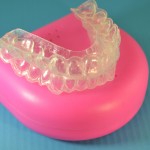
After orthodontic treatment a period of retention is considered necessary to ensure long-term stability and prevent relapse.
The aim of this study was compare the effects of three different retention strategies on counteracting orthodontic treatment relapse at least 5 years post retention.
Methods
After undergoing orthodontic treatment by a single experienced orthodontist patients were randomised to one of three retention methods: –
- Removable vacuum-formed retainer (VFR) covering the palate and the maxillary anterior teeth from canine-to-canine and bonded canine-to-canine retainer in the lower arch (group V-CTC);
- Maxillary VFR combined with stripping of the lower anterior teeth (group V-S);
- Prefabricated positioner covering all erupted teeth in the maxilla and the mandible (group P).
All retention appliances were provided within 1 hour of debonding.
Patients in groups V-CTC and V-S were instructed to wear the VFR for 22–24 hours per day for 2 days and nights and then at night for 12 months. In group P, the positioner was to be worn for 30 minutes during the daytime and during sleep for 12 months. During daytime wear the patients were instructed to actively chew into their positioners. The second year of retention patients wore their retainers every other night.
Dental Casts were taken before orthodontic treatment (T0); at appliance removal (T1); at two years (T2) and 5 or more years out of retention (T3). Maxillary and mandibular Little’s irregularity index (LII), intercanine and intermolar width, arch length, and overbite/overjet were recorded in a blinded manner
Results
- 75 patients were randomised (25 in each group)
- 69 patients completed the 2-year retention visit (24 in V-CTC group; 23 in V-S group; 22 in P group).
- 49 patients completed the 5-year without retention (16 in V-CTC group; 17 in V-S group; 16 in P group).
- No significant differences were found between the two groups
Conclusions
The authors concluded
After 5 years or more out of retention, the three retention methods had achieved equally favourable clinical results. Thus a maxillary VFR combined with a bonded canine-to-canine retainer in the mandible; a maxillary VFR combined with stripping of the mandibular anterior teeth and a prefabricated positioner can all be recommended. Hence, the clinician is not limited to routine use of a bonded mandibular canine-to-canine retainer: choice of retention method can be individualized, taking into account such variables as orthodontic diagnosis, the expected level of patient compliance and the patient’s wishes and financial considerations.
Commentary
This paper reports the outcomes 5 years or more out of orthodontic retention fro a group of patients. Previously this group had reported the outcomes of this study after completion of two years retention (Dental Elf – 22nd Jan 2013). At that time they reported no differences between the 3 groups and that continues to be the case. However as with most long-term studies there is the problem of loss to follow up which in this case is 35% although similar in each arm of the study. The 2006 Cochrane review by Littlewood et al identified a lack of randomised trials to assess the effectiveness of retention methods in orthodontics since then a small number have been published but more high quality studies are needed.
Links
Edman Tynelius G, Petrén S, Bondemark L, Lilja-Karlander E. Five-year postretention outcomes of three retention methods-a randomized controlled trial. Eur J Orthod. 2014 Dec 1. pii: cju063. [Epub ahead of print] PubMed PMID: 25452629.
Littlewood SJ, Millett DT, Doubleday B, Bearn DR, Worthington HV. Retention procedures for stabilising tooth position after treatment with orthodontic braces. Cochrane Database of Systematic Reviews 2006, Issue 1. Art. No.: CD002283. DOI: 10.1002/14651858.CD002283.pub3.
Dental Elf – 14th Mar 2014 – Orthodontic retention – cost analysis of three different appliances

Orthodontic retention: trial finds no difference between three methods at 5 years http://t.co/qvVzkmNWX7
Don’t miss – Orthodontic retention: no difference with three methods at 5 years http://t.co/SkIAndTc00
I blogged on this a while back. Orthodontic retention: trial finds no difference between three methods at 5 years http://t.co/bCUJYAyhu7
Read Kevin’s @OBrienK57 blog on this orthodontic retention paper http://bit.ly/1y4cFnB
[…] Dental Elf – 15th Jan 2015 – Orthodontic retention: trial finds no difference between three … […]